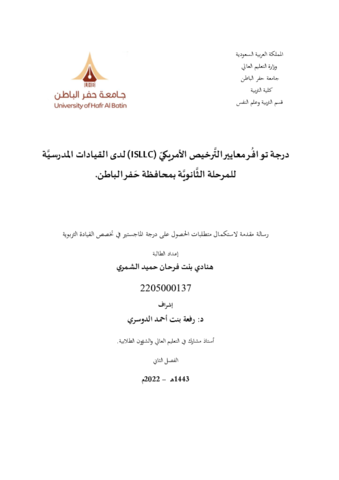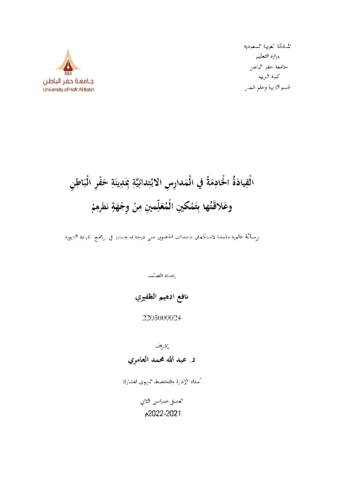Document
درجة ممارسة القيادة الخادمة لدى قادة المدارس الابتدائية بمحافظة حفر الباطن و علاقتها بمستوى الثقة التنظيمية
Alternative Title
Degree of servant leadership practice among primary school leaders in Hafr AlBatin Governorate and its relationship to the level of organizational trust
Contributor
الدوسري، رفعة أحمد محمد, Thesis advisor
Dewey Classification
372.12009531396
Subject
Description
هدفت الدراسة إلى الكشف عن درجة ممارسة قائدات المدارس الابتدائية الحكومية بمحافظة حفر الباطن للقيادة الخادمة وعلاقتها بمستو الثقة التنظيمية لدى معلمات المرحلة الابتدائية الحكومية في محافظة حفر الباطن، وضمنت الدراسة الحالية في طياتها خمسة فصول، بالإضافة إلى قائمة المراجع، والملاحق، وذلك على النحو التالي:
الفصل الأول: تناول مقدمة الدراسة، ومشكلتها، وأسئلتها، وأهدافها، وأهميتها، وحدودها، وأهم المصطلحات التي تناولتها الدراسة.
مشكلة الدراسة:
تحددت مشكلة الدارسة في السؤال التالي:
" ما مستو ممارسة قائدات المدارس الابتدائية بمحافظة حفر الباطن للقيادة الخادمة وما علاقتها بمستوى الثقة التنظيمية لدى المعلمات العاملات في مدارس حفر الباطن من وجهة نظرهن؟"
وتفرع منه الأسئلة التالية:
1) ما درجة ممارسة قائدات المدارس الابتدائية بمدينة حفر الباطن لأبعاد القيادة الخادمة
(التمكين، الاهتمام بالمعلمين، التصرف بأخلاق، تقديم قيمة للمجتمع) من وجهة نظر المعلمات؟
2) ما مستوى الثقة التنظيمية بأبعادها (الثقة بإدارة المدرسة، الثقة بزملاء العمل، الثقة ببيئة العمل والقرارات التنظيمية) لدى معلمات المرحلة الابتدائية في مدينة حفر الباطن من وجهة نظرهن؟
3) هل توجد علاقة ارتباطية ذات دلالة إحصائية بين درجة ممارسة قائدات المدارس الابتدائية بمدينة حفر الباطن ومستوى الثقة التنظيمية لد المعلمات من وجهة نظرهن؟
أهداف الدراسة:
1. الكشف عن درجة ممارسة قائدات المدارس الابتدائية بمحافظة حفر الباطن لأبعاد القيادة الخادمة (التمكين، الاهتمام بالمعلمين، التصرف بأخلاق، وتقديم قيمة للمجتمع) من وجهة نظر المعلمات.
2. التعرف على مستو الثقة التنظيمية بأبعادها (الثقة بإدارة المدرسة، الثقة بزملاء العمل، الثقة ببيئة العمل والقرارات التنظيمية) لدى معلمات المرحلة الابتدائية في مدينة حفر الباطن.
3. التحقق من وجود علاقة ارتباطية بين درجة ممارسة قائدات المدارس الابتدائية بحفر الباطن للقيادة الخادمة ومستوى الثقة التنظيمية للمعلمات من وجهة نظرهن.
4. التوصل لدور القيادة الخادمة كمدخل قيادي يحقق الثقة التنظيمية لدى معلمات المرحلة الابتدائية.
أهمية الدراسة:
تكمن أهمية الدارسة فيما يلي:
الأهمية النظرية:
1. تكتسب الدراسة أهميتها النظرية من أهمية الموضوع، والأهداف التي تسعى لتحقيقها، فالقيادة الخادمة من الموضوعات الإدارية المهمة، والتي لا تزال تحظى باهتمام بالغ من قبل المهتمين في هذا المجال، وكذلك فهم علاقتها بمستوى الثقة التنظيمية للمعلمات على وجه الخصوص.
2. يتوقع أن تسهم الدراسة الحالية في إثراء البحوث التربوية في جوانب القيادة الخادمة، وعلاقتها بمستوى الثقة التنظيمية لدى المعلمات.
3. تشكل الدراسة إطارا منهجيا معرفيا يمكن للباحثين الرجوع والاستناد إليه عند إجراء الدراسات المتعلقة بالموضوع مستقبلا.
4. تشكل الدراسة الإطار المعرفي الخاص بممارسة القيادة الخادمة لدى قادة المدارس الابتدائية وعلاقتها بمستوى الثقة التنظيمية.
الأهمية التطبيقية:
1. بيان درجة ممارسة القيادة الخادمة لد قادة المدارس الابتدائية و علاقتها بمستوى الثقة التنظيمية في مدينة حفر الباطن.
2. إسهام هذه الدراسة في زيادة الحصيلة المعرفية لدى قادة المدارس بأبعاد القيادة الخادمة من
خلال النتائج التي تلقي الضوء على مستوى ممارسة القيادة الخادمة ومستوىالثقة التنظيمية لدى قادة المدارس بمدينة حفر الباطن، مما يفيد المسؤولين في توظيف نتائجها بما ينعكس إيجابا على العملية التعليمية، وعلى مستوى الثقة التنظيمية لدى المعلمات.
3. قد تفيد الدراسة متخذي القرار بالإدارات التعليمية وتشجعهم على تنفيذ برامج تدريبية، وورش عمل لقائدات المدارس حول ممارسة القيادة الخادمة ومد تأثيرها في ارتقاء العمل التربوي في المدارس.
4. يؤمل أن ترسم هذه الدراسة رؤية واضحة لإدارة التعليم من خلال تحفيز قائدات المدارس على ممارسة النمط القيادي الخادم، وصياغة منظومة عمل لرفع مستو الثقة التنظيمية لدى المعلمات.
5. الخروج ببعض التوصيات التي من شأنها أن تكون رافداً للإداريين والمسؤولين في الإدارات التعليمية العليا بتفعيل القيادة الخادمة بكافة أبعادها الإيجابية بما يحقق فعالية أداء قادة المدارس في المدارس الابتدائية.
الفصل الثاني : ناقش الإطار النظري للدراسة، وقد اشتمل على قسمين هما :
الإطار النظري الذي تضمن مبحثين، المبحث الأول القيادة الخادمة، والمبحث الثاني الثقة التنظيمية، كما تم استعراض الدراسات السابقة المرتبطة بموضوع الدراسة، وتضمنت الدراسات المتعلقة بالقيادة الخادمة، والدراسات المتعلقة بالثقة التنظيمية، والدراسات المتعلقة بالعلاقة بين القيادة الخادمة والثقة التنظيمية.
الفصل الثالث: تناول الفصل منهجية الدراسة وإجراءاتها، حيث تم استخدام المنهج الوصفي الارتباطي، والاستبانة كأداة للدراسة. كما تم توليا كيفية بناء الاستبانة، وآلية التحقق من صدقها وثباتها، وإجراءات تطبيق الدراسة، والأساليب الإحصائية المستخدمة في معالجة البيانات.
الفصل الرابع: تم في هذا الفصل الإجابة عن أسئلة الدراسة، ومناقشتها، وتحليلها، وتفسيرها وربطها بالدراسات السابقة، وتوليا مد الاتفاق والاختلاف فيما توصلت إليه من أجل الوصول إلى أهداف الدراسة.
الفصل الخامس: فقد تضمن على ملخص نتائج الدراسة وأبرز ما انتهت إليه من نتائج، والتوصيات المقترحة في ضوء تلك النتائج، والمقترحات لدراسات مستقبلية.
نتائج الدراسة:
1. أظهرت الدراسة وجود علاقة ارتباطية طردية قوية بين درجة ممارسة قائدات المدارس الابتدائية بمدينة حفر الباطن للقيادة الخادمة ومستوى الثقة التنظيمية لدى المعلمات، حيث بلغ معامل الارتباط (0.91).
2. أظهرت الدارسة أن درجة ممارسة قائدات المدارس الابتدائية بمدينة حفر الباطن لأبعاد القيادة الخادمة، جاءت بدرجة كبيرة جدا، وبنسبة تأييد 78.37%.
3. أظهرت الدراسة أن مستوى الثقة التنظيمية بأبعادها لد معلمات المرحلة الابتدائية، جاءت بدرجة كبيرة جدا، وبنسبة تأييد 87.23%.
4. بينت الدارسة أن أعلى درجة ممارسة لأبعاد القيادة الخادمة لد قائدات المدارس الابتدائية بمدينة حفر الباطن كانت لبعد "التصرف بأخلاق"، وجاءت بدرجة كبيرة جدا، وبنسبة 89%.
5. بينت الدارسة أن أقل درجة ممارسة لأبعاد القيادة الخادمة لدى قائدات المدارس الابتدائية بمدينة حفر الباطن كانت لبعد "التمكين"، وجاءت بدرجة كبيرة جداً، وبنسبة 85.73%
6. أظهرت الدارسة أن درجة ممارسة قائدات المدارس الابتدائية بمدينة حفر الباطن لبعد الاهتمام بالمرؤوسين في القيادة الخادمة، جاء بدرجة كبيرة جداً، وبنسبة تأييد 86.98%.
7. أظهرت الدراسة أن درجة ممارسة قائدات المدارس الابتدائية بمدينة حفر الباطن لبعد تطوير المجتمع في القيادة الخادمة، جاء بدرجة كبيرة جدا، وبنسبة تأييد 87.76%.
8. أظهرت الدراسة أن أعلى مستوى للثقة التنظيمية لد معلمات المرحلة الابتدائية، كان في الثقة الزملاء، وجاء بدرجة كبيرة جدا، وبنسبة 88.03%.
9. أظهرت الدارسة أن مستوى الثقة بإدارة المدرسة لد معلمات المرحلة الابتدائية، جاء بدرجة كبيرة جدا، وبنسبة تأييد 87.57%.
10. أظهرت الدراسة أن أقوى علاقة ارتباط كانت بين بدعد "التصرف بأخلاق" ومستوى (الثقة التنظيمية لد المعلمات، حيث بلغ معامل الارتباط بيرسون (0.87).
11. أظهرت الدارسة أن أضعف علاقة ارتباط كانت بين بعد "التمكين" ومستوى الثقة التنظيمية لدى المعلمات، حيث بلغ معامل الارتباط بيرسون (0.74).
12. أظهرت الدارسة وجود علاقة ارتباط طردية قوية بين بعد " الاهتمام بالمرؤوسين" ومستوى الثقة التنظيمية لدى المعلمات، حيث بلغ معامل الارتباط بيرسون (0.85).
13. أظهرت الدارسة وجود علاقة ارتباط طردية قوية بين بعد " تطوير المجتمع " ومستوى الثقة التنظيمية لدى المعلمات، حيث بلغ معامل الارتباط بيرسون (0.85).
توصيات الدراسة :
1. تضمين عملية تمكين المعلمين في الخطط المدرسية، وإعطاء أهمية كبيرة لها.
2. وضع معيار من قبل وزارة التعليم للمخطط المدرسية يتعلق بإشراك المعلمين في عملية التخطيط.
3. تدريب قادة المدارس على آليات توزيع المهام للمعلمين بعدالة وفقا لقدراتهم.
4. حث قادة المدارس على تحقيق احتياجات المعلمين، وفقا لرؤية، واضحة، ومحددة.
5. تطوير أدوات تقييم أداء قادة المدارس ليشمل على معايير تخص (تمكين المعلمين، تطوير المجتمع).
مقترحات الدراسة :
1. معوقات ممارسة القيادة الخادمة في المدارس الابتدائية.
2. متطلبات ممارسة القيادة الخادمة في المدارس الابتدائية.
3. إجراء الدراسة نفسها على مرحلة تعليمية أخرى.
The purpose of the study is to detect the degree of the practice of primary school leaders' in Hafr Al-Batin Governorate for the servant leadership and its relation to the level of organizational trust among governmental primary school teachers in Hafr Al-Batin Governorate.
Thecurrent study included five chapters, in addition to a list of references, and
appendices, on as follows:
The first chapter: contained the introduction of the study, its problem, questions, objectives, importance, limits, and the most important terms dealt with in the study.
The study Problem:
The problem of the study is determined in the following question:
"What is the level of Servant Leadership practice by primary school leaders
in Hafr Al-Batin and what is its relationship to the level of Organizational Trust of working teachers in Hafr Al-Batin schools from their point of view?"
The following questions arise from it:
1-What is the degree of practice primary school leaders in Hafr Al-Batin to
the dimensions of servant leadership (empowerment, caring for teachers, behaving with morals, providing value to society) from the teachers' point of view?
2-What is the level of Organizational Trust in its dimensions (confidence in school administration, trust in co-workers, trust in the work environment and organizational decisions) among primary school teachers in Hafr Al-Batin from their point of view?
3- Is there a correlation relationship with a statistically significant between the degree of practice of primary school leaders in Hafr Al-Batin and the level Organizational Trust of teachers from their point of view?
Objectives of study:
1. Detecting the degree of practice of primary school leaders in Hafr Al- Batin governorate practice the dimensions of Servant Leadership (empowerment, caring for teachers, behaving with morals, and providing value to society) from the point of view of teachers.
2. Identifying the level of Organizational Trust in its dimensions (Trust in school management, Trust in co-workers, Trust in the work environment and organizational decisions) among primary school teachers in the city of Hafr Al-Batin.
3. Verify for a correlation relationship between the degree of practice of
primary school leaders in Hafr Al-Batin's of Servant Leadership and the
level Organizational Trust of teachers from their point of view.
•Reaching the role of Servant Leadership as a leadership approach that
achieves Organizational Trust among primary school teachers.
Significance of the study:
Theoretical importance:
•The study acquires its theoretical importance from the importance of the subject, and the objectives that seeks to achieve, as servant leadership is one of the important administrative issues, which is still of very interest by those interested in this field, as well as understanding its relationship with the level organizational trust for teachers in particular.
•The current study is expected to contribute to enriching the educational research in the aspects of Servant Leadership, and its relationship at the level Organizational Trust of teachers.
•The study constitutes a methodological and cognitive framework that researchers can refer to and rely upon when examining studies related to the subject in the future.
•The study constitutes the cognitive framework for the practice of Servant Leadership among primary school leaders and its relationship with level Organizational Trust.
Applied importance:
•An indication of the degree of servant leadership practice among primary school leaders and its relationship to the level of Organizational Trust in the city of Hafr Al-Batin.
•The contribution of this study to increasing the knowledge outcome of school leaders in the dimensions of servant leadership through the results that highlight on the level of servant leadership practice and the level of organizational trust among school leaders in Hafr Al-Batin, which benefits the officials for employing its results, which reflecting the positively on the educational process, and on the level of organizational trust to teachers.
•The study may benefit decision makers in educational administrations and encourage them to implement training programs and workshops for school leaders on the practice of servant leadership and its impact on the progress of educational work in schools.
•It hopes that this study will draw a clear vision for the management of education by stimulating school leaders to practice the servant leadership style, and formulating a work system to raise the level of organizational trust among teachers.
•Exit some of the recommendations that would be a tributary for administrators and officials in higher educational administrations by activating servant leadership in all its positive dimensions in order to achieve the effective performance of school leaders in primary schools.
The second chapter: discussed the theoretical framework of the study, and
it included two parts:
The theoretical framework, which included two sections, the first topic is Servant Leadership, and the second topic is Organizational Trust.
Previous studies related to the subject of the study were also reviewed, and included studies related to servant leadership, studies related to organizational trust, and studies related to the relationship between Servant Leadership and Organizational Trust.
The third chapter: The chapter dealt with the study methodology and its procedures, where the descriptive correlative approach was used, and the questionnaire as a tool for the study. It was also clarified how to build the questionnaire, the mechanism for verifying its validity and stability, the
procedures for applying the study, and the statistical methods used in data
processing.
Chapter Four: In this chapter, the study questions were answered,
discussed, analyzed, interpreted and linked to previous studies, and clarified
the extent of agreement and difference in what it reached in order to reach the objectives of the study.
Chapter Five: It included a summary of the study's results, the most prominent findings, the suggested recommendations in light of those results, and suggestions for future studies.
Study Results:
1. The study showed a strong direct correlation relationship between the degree of Servant Leadership practice of primary school leaders in Hafr Al-Batin and the level of Organizational Trust among the teachers, where the correlation coefficient was (0.91).
2. The result of the study showed that the degree of practice primary school leaders in Hafr Al-Batin practicing the dimensions of Servant Leadership was very high, with a support rate of 78.37%.
3. The study showed that the level of Organizational Trust in its dimensions among primary school teachers was very high, with a support rate of 87.23%.
4. The study showed that the highest degree of practicing the dimensions of Servant Leadership among primary school leaders in Hafr Al-Batin was for the dimension of "behaving with morals", and it came to a very large degree, at a rate of 89%.
5. The study showed that the lowest degree of practicing servant leadership dimensions among primary school leaders in Hafr Al-Batin was for the dimension of "empowerment", and it came to a very large degree, with a rate of 85.73%.
6. The study showed that the degree of practice of primary school leaders in Hafr Al-Batin after paying attention to subordinates in the Servant Leadership was very high, with a support rate of 86.98%.
7. The study showed that the degree to which primary school leaders in Hafr Al-Batin practice the dimension of community development in Servant Leadership, came to a very large degree, with a support rate of 87.76%.
8. The study showed that the highest level of Organizational Trust among primary school teachers was in the confidence of colleagues, and it came to a very large degree, with a percentage of 88.03%.
9. The study showed that the level of trust in school administration among primary school teachers was very high, with an approval rate of 87.57%.
10. The study showed that the strongest correlation was between the dimension of "behaving ethically" and the level of Organizational Trust among the teachers, where the Pearson correlation coefficient was (0.87).
11. The study showed that the weakest correlation relationship was between the "empowerment" dimension and the level of Organizational Trust among the teachers, where the Pearson correlation coefficient was (0.74).
12. The study showed that there is a strong direct correlation relationship between the dimension of "interest in subordinates" and the level of Organizational Trust among the teachers, where the Pearson correlation coefficient reached (0.85).
13. The study showed that there is a strong direct correlation relationship
between the dimension of "community development" and the level of Organizational Trust among the teachers, where the Pearson correlation coefficient reached (0.85).
Study Recommendations:
1. Include the process of empowering teachers in school plans and give great
importance to it.
2. Setting a standard by the Ministry of Education for school plans regarding
the involvement of teachers in the planning process.
3. Training school leaders on the mechanisms of distributing tasks to teachers
fairly, according to their abilities.
4. Urged school leaders to achieve the needs of teachers, according to a clear
and specific vision.
5. Developing tools for evaluating the performance of school leaders to
include criteria related to (teacher empowerment, community development).
Recommendations for further Research:
1. Obstacles of practice servant leadership in primary schools.
2. requirements of practice servant leadership in primary schools.
3. Conduct the same study on another educational stage.
الفصل الأول: تناول مقدمة الدراسة، ومشكلتها، وأسئلتها، وأهدافها، وأهميتها، وحدودها، وأهم المصطلحات التي تناولتها الدراسة.
مشكلة الدراسة:
تحددت مشكلة الدارسة في السؤال التالي:
" ما مستو ممارسة قائدات المدارس الابتدائية بمحافظة حفر الباطن للقيادة الخادمة وما علاقتها بمستوى الثقة التنظيمية لدى المعلمات العاملات في مدارس حفر الباطن من وجهة نظرهن؟"
وتفرع منه الأسئلة التالية:
1) ما درجة ممارسة قائدات المدارس الابتدائية بمدينة حفر الباطن لأبعاد القيادة الخادمة
(التمكين، الاهتمام بالمعلمين، التصرف بأخلاق، تقديم قيمة للمجتمع) من وجهة نظر المعلمات؟
2) ما مستوى الثقة التنظيمية بأبعادها (الثقة بإدارة المدرسة، الثقة بزملاء العمل، الثقة ببيئة العمل والقرارات التنظيمية) لدى معلمات المرحلة الابتدائية في مدينة حفر الباطن من وجهة نظرهن؟
3) هل توجد علاقة ارتباطية ذات دلالة إحصائية بين درجة ممارسة قائدات المدارس الابتدائية بمدينة حفر الباطن ومستوى الثقة التنظيمية لد المعلمات من وجهة نظرهن؟
أهداف الدراسة:
1. الكشف عن درجة ممارسة قائدات المدارس الابتدائية بمحافظة حفر الباطن لأبعاد القيادة الخادمة (التمكين، الاهتمام بالمعلمين، التصرف بأخلاق، وتقديم قيمة للمجتمع) من وجهة نظر المعلمات.
2. التعرف على مستو الثقة التنظيمية بأبعادها (الثقة بإدارة المدرسة، الثقة بزملاء العمل، الثقة ببيئة العمل والقرارات التنظيمية) لدى معلمات المرحلة الابتدائية في مدينة حفر الباطن.
3. التحقق من وجود علاقة ارتباطية بين درجة ممارسة قائدات المدارس الابتدائية بحفر الباطن للقيادة الخادمة ومستوى الثقة التنظيمية للمعلمات من وجهة نظرهن.
4. التوصل لدور القيادة الخادمة كمدخل قيادي يحقق الثقة التنظيمية لدى معلمات المرحلة الابتدائية.
أهمية الدراسة:
تكمن أهمية الدارسة فيما يلي:
الأهمية النظرية:
1. تكتسب الدراسة أهميتها النظرية من أهمية الموضوع، والأهداف التي تسعى لتحقيقها، فالقيادة الخادمة من الموضوعات الإدارية المهمة، والتي لا تزال تحظى باهتمام بالغ من قبل المهتمين في هذا المجال، وكذلك فهم علاقتها بمستوى الثقة التنظيمية للمعلمات على وجه الخصوص.
2. يتوقع أن تسهم الدراسة الحالية في إثراء البحوث التربوية في جوانب القيادة الخادمة، وعلاقتها بمستوى الثقة التنظيمية لدى المعلمات.
3. تشكل الدراسة إطارا منهجيا معرفيا يمكن للباحثين الرجوع والاستناد إليه عند إجراء الدراسات المتعلقة بالموضوع مستقبلا.
4. تشكل الدراسة الإطار المعرفي الخاص بممارسة القيادة الخادمة لدى قادة المدارس الابتدائية وعلاقتها بمستوى الثقة التنظيمية.
الأهمية التطبيقية:
1. بيان درجة ممارسة القيادة الخادمة لد قادة المدارس الابتدائية و علاقتها بمستوى الثقة التنظيمية في مدينة حفر الباطن.
2. إسهام هذه الدراسة في زيادة الحصيلة المعرفية لدى قادة المدارس بأبعاد القيادة الخادمة من
خلال النتائج التي تلقي الضوء على مستوى ممارسة القيادة الخادمة ومستوىالثقة التنظيمية لدى قادة المدارس بمدينة حفر الباطن، مما يفيد المسؤولين في توظيف نتائجها بما ينعكس إيجابا على العملية التعليمية، وعلى مستوى الثقة التنظيمية لدى المعلمات.
3. قد تفيد الدراسة متخذي القرار بالإدارات التعليمية وتشجعهم على تنفيذ برامج تدريبية، وورش عمل لقائدات المدارس حول ممارسة القيادة الخادمة ومد تأثيرها في ارتقاء العمل التربوي في المدارس.
4. يؤمل أن ترسم هذه الدراسة رؤية واضحة لإدارة التعليم من خلال تحفيز قائدات المدارس على ممارسة النمط القيادي الخادم، وصياغة منظومة عمل لرفع مستو الثقة التنظيمية لدى المعلمات.
5. الخروج ببعض التوصيات التي من شأنها أن تكون رافداً للإداريين والمسؤولين في الإدارات التعليمية العليا بتفعيل القيادة الخادمة بكافة أبعادها الإيجابية بما يحقق فعالية أداء قادة المدارس في المدارس الابتدائية.
الفصل الثاني : ناقش الإطار النظري للدراسة، وقد اشتمل على قسمين هما :
الإطار النظري الذي تضمن مبحثين، المبحث الأول القيادة الخادمة، والمبحث الثاني الثقة التنظيمية، كما تم استعراض الدراسات السابقة المرتبطة بموضوع الدراسة، وتضمنت الدراسات المتعلقة بالقيادة الخادمة، والدراسات المتعلقة بالثقة التنظيمية، والدراسات المتعلقة بالعلاقة بين القيادة الخادمة والثقة التنظيمية.
الفصل الثالث: تناول الفصل منهجية الدراسة وإجراءاتها، حيث تم استخدام المنهج الوصفي الارتباطي، والاستبانة كأداة للدراسة. كما تم توليا كيفية بناء الاستبانة، وآلية التحقق من صدقها وثباتها، وإجراءات تطبيق الدراسة، والأساليب الإحصائية المستخدمة في معالجة البيانات.
الفصل الرابع: تم في هذا الفصل الإجابة عن أسئلة الدراسة، ومناقشتها، وتحليلها، وتفسيرها وربطها بالدراسات السابقة، وتوليا مد الاتفاق والاختلاف فيما توصلت إليه من أجل الوصول إلى أهداف الدراسة.
الفصل الخامس: فقد تضمن على ملخص نتائج الدراسة وأبرز ما انتهت إليه من نتائج، والتوصيات المقترحة في ضوء تلك النتائج، والمقترحات لدراسات مستقبلية.
نتائج الدراسة:
1. أظهرت الدراسة وجود علاقة ارتباطية طردية قوية بين درجة ممارسة قائدات المدارس الابتدائية بمدينة حفر الباطن للقيادة الخادمة ومستوى الثقة التنظيمية لدى المعلمات، حيث بلغ معامل الارتباط (0.91).
2. أظهرت الدارسة أن درجة ممارسة قائدات المدارس الابتدائية بمدينة حفر الباطن لأبعاد القيادة الخادمة، جاءت بدرجة كبيرة جدا، وبنسبة تأييد 78.37%.
3. أظهرت الدراسة أن مستوى الثقة التنظيمية بأبعادها لد معلمات المرحلة الابتدائية، جاءت بدرجة كبيرة جدا، وبنسبة تأييد 87.23%.
4. بينت الدارسة أن أعلى درجة ممارسة لأبعاد القيادة الخادمة لد قائدات المدارس الابتدائية بمدينة حفر الباطن كانت لبعد "التصرف بأخلاق"، وجاءت بدرجة كبيرة جدا، وبنسبة 89%.
5. بينت الدارسة أن أقل درجة ممارسة لأبعاد القيادة الخادمة لدى قائدات المدارس الابتدائية بمدينة حفر الباطن كانت لبعد "التمكين"، وجاءت بدرجة كبيرة جداً، وبنسبة 85.73%
6. أظهرت الدارسة أن درجة ممارسة قائدات المدارس الابتدائية بمدينة حفر الباطن لبعد الاهتمام بالمرؤوسين في القيادة الخادمة، جاء بدرجة كبيرة جداً، وبنسبة تأييد 86.98%.
7. أظهرت الدراسة أن درجة ممارسة قائدات المدارس الابتدائية بمدينة حفر الباطن لبعد تطوير المجتمع في القيادة الخادمة، جاء بدرجة كبيرة جدا، وبنسبة تأييد 87.76%.
8. أظهرت الدراسة أن أعلى مستوى للثقة التنظيمية لد معلمات المرحلة الابتدائية، كان في الثقة الزملاء، وجاء بدرجة كبيرة جدا، وبنسبة 88.03%.
9. أظهرت الدارسة أن مستوى الثقة بإدارة المدرسة لد معلمات المرحلة الابتدائية، جاء بدرجة كبيرة جدا، وبنسبة تأييد 87.57%.
10. أظهرت الدراسة أن أقوى علاقة ارتباط كانت بين بدعد "التصرف بأخلاق" ومستوى (الثقة التنظيمية لد المعلمات، حيث بلغ معامل الارتباط بيرسون (0.87).
11. أظهرت الدارسة أن أضعف علاقة ارتباط كانت بين بعد "التمكين" ومستوى الثقة التنظيمية لدى المعلمات، حيث بلغ معامل الارتباط بيرسون (0.74).
12. أظهرت الدارسة وجود علاقة ارتباط طردية قوية بين بعد " الاهتمام بالمرؤوسين" ومستوى الثقة التنظيمية لدى المعلمات، حيث بلغ معامل الارتباط بيرسون (0.85).
13. أظهرت الدارسة وجود علاقة ارتباط طردية قوية بين بعد " تطوير المجتمع " ومستوى الثقة التنظيمية لدى المعلمات، حيث بلغ معامل الارتباط بيرسون (0.85).
توصيات الدراسة :
1. تضمين عملية تمكين المعلمين في الخطط المدرسية، وإعطاء أهمية كبيرة لها.
2. وضع معيار من قبل وزارة التعليم للمخطط المدرسية يتعلق بإشراك المعلمين في عملية التخطيط.
3. تدريب قادة المدارس على آليات توزيع المهام للمعلمين بعدالة وفقا لقدراتهم.
4. حث قادة المدارس على تحقيق احتياجات المعلمين، وفقا لرؤية، واضحة، ومحددة.
5. تطوير أدوات تقييم أداء قادة المدارس ليشمل على معايير تخص (تمكين المعلمين، تطوير المجتمع).
مقترحات الدراسة :
1. معوقات ممارسة القيادة الخادمة في المدارس الابتدائية.
2. متطلبات ممارسة القيادة الخادمة في المدارس الابتدائية.
3. إجراء الدراسة نفسها على مرحلة تعليمية أخرى.
The purpose of the study is to detect the degree of the practice of primary school leaders' in Hafr Al-Batin Governorate for the servant leadership and its relation to the level of organizational trust among governmental primary school teachers in Hafr Al-Batin Governorate.
Thecurrent study included five chapters, in addition to a list of references, and
appendices, on as follows:
The first chapter: contained the introduction of the study, its problem, questions, objectives, importance, limits, and the most important terms dealt with in the study.
The study Problem:
The problem of the study is determined in the following question:
"What is the level of Servant Leadership practice by primary school leaders
in Hafr Al-Batin and what is its relationship to the level of Organizational Trust of working teachers in Hafr Al-Batin schools from their point of view?"
The following questions arise from it:
1-What is the degree of practice primary school leaders in Hafr Al-Batin to
the dimensions of servant leadership (empowerment, caring for teachers, behaving with morals, providing value to society) from the teachers' point of view?
2-What is the level of Organizational Trust in its dimensions (confidence in school administration, trust in co-workers, trust in the work environment and organizational decisions) among primary school teachers in Hafr Al-Batin from their point of view?
3- Is there a correlation relationship with a statistically significant between the degree of practice of primary school leaders in Hafr Al-Batin and the level Organizational Trust of teachers from their point of view?
Objectives of study:
1. Detecting the degree of practice of primary school leaders in Hafr Al- Batin governorate practice the dimensions of Servant Leadership (empowerment, caring for teachers, behaving with morals, and providing value to society) from the point of view of teachers.
2. Identifying the level of Organizational Trust in its dimensions (Trust in school management, Trust in co-workers, Trust in the work environment and organizational decisions) among primary school teachers in the city of Hafr Al-Batin.
3. Verify for a correlation relationship between the degree of practice of
primary school leaders in Hafr Al-Batin's of Servant Leadership and the
level Organizational Trust of teachers from their point of view.
•Reaching the role of Servant Leadership as a leadership approach that
achieves Organizational Trust among primary school teachers.
Significance of the study:
Theoretical importance:
•The study acquires its theoretical importance from the importance of the subject, and the objectives that seeks to achieve, as servant leadership is one of the important administrative issues, which is still of very interest by those interested in this field, as well as understanding its relationship with the level organizational trust for teachers in particular.
•The current study is expected to contribute to enriching the educational research in the aspects of Servant Leadership, and its relationship at the level Organizational Trust of teachers.
•The study constitutes a methodological and cognitive framework that researchers can refer to and rely upon when examining studies related to the subject in the future.
•The study constitutes the cognitive framework for the practice of Servant Leadership among primary school leaders and its relationship with level Organizational Trust.
Applied importance:
•An indication of the degree of servant leadership practice among primary school leaders and its relationship to the level of Organizational Trust in the city of Hafr Al-Batin.
•The contribution of this study to increasing the knowledge outcome of school leaders in the dimensions of servant leadership through the results that highlight on the level of servant leadership practice and the level of organizational trust among school leaders in Hafr Al-Batin, which benefits the officials for employing its results, which reflecting the positively on the educational process, and on the level of organizational trust to teachers.
•The study may benefit decision makers in educational administrations and encourage them to implement training programs and workshops for school leaders on the practice of servant leadership and its impact on the progress of educational work in schools.
•It hopes that this study will draw a clear vision for the management of education by stimulating school leaders to practice the servant leadership style, and formulating a work system to raise the level of organizational trust among teachers.
•Exit some of the recommendations that would be a tributary for administrators and officials in higher educational administrations by activating servant leadership in all its positive dimensions in order to achieve the effective performance of school leaders in primary schools.
The second chapter: discussed the theoretical framework of the study, and
it included two parts:
The theoretical framework, which included two sections, the first topic is Servant Leadership, and the second topic is Organizational Trust.
Previous studies related to the subject of the study were also reviewed, and included studies related to servant leadership, studies related to organizational trust, and studies related to the relationship between Servant Leadership and Organizational Trust.
The third chapter: The chapter dealt with the study methodology and its procedures, where the descriptive correlative approach was used, and the questionnaire as a tool for the study. It was also clarified how to build the questionnaire, the mechanism for verifying its validity and stability, the
procedures for applying the study, and the statistical methods used in data
processing.
Chapter Four: In this chapter, the study questions were answered,
discussed, analyzed, interpreted and linked to previous studies, and clarified
the extent of agreement and difference in what it reached in order to reach the objectives of the study.
Chapter Five: It included a summary of the study's results, the most prominent findings, the suggested recommendations in light of those results, and suggestions for future studies.
Study Results:
1. The study showed a strong direct correlation relationship between the degree of Servant Leadership practice of primary school leaders in Hafr Al-Batin and the level of Organizational Trust among the teachers, where the correlation coefficient was (0.91).
2. The result of the study showed that the degree of practice primary school leaders in Hafr Al-Batin practicing the dimensions of Servant Leadership was very high, with a support rate of 78.37%.
3. The study showed that the level of Organizational Trust in its dimensions among primary school teachers was very high, with a support rate of 87.23%.
4. The study showed that the highest degree of practicing the dimensions of Servant Leadership among primary school leaders in Hafr Al-Batin was for the dimension of "behaving with morals", and it came to a very large degree, at a rate of 89%.
5. The study showed that the lowest degree of practicing servant leadership dimensions among primary school leaders in Hafr Al-Batin was for the dimension of "empowerment", and it came to a very large degree, with a rate of 85.73%.
6. The study showed that the degree of practice of primary school leaders in Hafr Al-Batin after paying attention to subordinates in the Servant Leadership was very high, with a support rate of 86.98%.
7. The study showed that the degree to which primary school leaders in Hafr Al-Batin practice the dimension of community development in Servant Leadership, came to a very large degree, with a support rate of 87.76%.
8. The study showed that the highest level of Organizational Trust among primary school teachers was in the confidence of colleagues, and it came to a very large degree, with a percentage of 88.03%.
9. The study showed that the level of trust in school administration among primary school teachers was very high, with an approval rate of 87.57%.
10. The study showed that the strongest correlation was between the dimension of "behaving ethically" and the level of Organizational Trust among the teachers, where the Pearson correlation coefficient was (0.87).
11. The study showed that the weakest correlation relationship was between the "empowerment" dimension and the level of Organizational Trust among the teachers, where the Pearson correlation coefficient was (0.74).
12. The study showed that there is a strong direct correlation relationship between the dimension of "interest in subordinates" and the level of Organizational Trust among the teachers, where the Pearson correlation coefficient reached (0.85).
13. The study showed that there is a strong direct correlation relationship
between the dimension of "community development" and the level of Organizational Trust among the teachers, where the Pearson correlation coefficient reached (0.85).
Study Recommendations:
1. Include the process of empowering teachers in school plans and give great
importance to it.
2. Setting a standard by the Ministry of Education for school plans regarding
the involvement of teachers in the planning process.
3. Training school leaders on the mechanisms of distributing tasks to teachers
fairly, according to their abilities.
4. Urged school leaders to achieve the needs of teachers, according to a clear
and specific vision.
5. Developing tools for evaluating the performance of school leaders to
include criteria related to (teacher empowerment, community development).
Recommendations for further Research:
1. Obstacles of practice servant leadership in primary schools.
2. requirements of practice servant leadership in primary schools.
3. Conduct the same study on another educational stage.
Date Issued
2021-05-04
Thesis Type
ماجستير
Institution
جامعة حفر الباطن، كلية التربية، قسم التربية وعلم النفس
Extent
أ-ن، 115 ورقة
Language
Arabic
Subject (Geographic)
Note
يشتمل على مستخلص باللغتين العربية والإنجليزية
Member of
Same Subject





